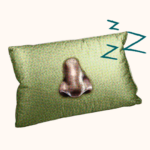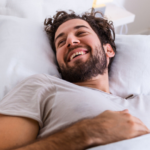What is sleep?
Sleep is when your body has a temporary lack of awareness of yourself and your surroundings, and reduced responsiveness to stimulation.
During sleep, activities in your brain and the rest of your body are different than when you are awake.
Sleep is essential for the repair and regeneration of cells, tissues and organs of your body, and for storing memories and helping to regulate your mood, emotions and overall mental wellbeing.
The four sleep stages do not happen in perfect order but they cycle over periods of about 90 minutes throughout the night. The body’s own clock — its circadian rhythm — is responsible for syncing sleep with nighttime.
Things that upset your circadian rhythm, like shift work and jet lag, can cause sleep problems in some people.
Everyone’s sleep needs are slightly different, and there are differences in sleep between males and females.
For example, women tend to sleep earlier in the evening than men, and physiological measurements of sleep suggest women sleep longer and have more deep sleep than men but, in general, men believe they have better quality sleep than women.
For sleep to be normal and healthy it needs to be long enough, with uninterrupted cycles through the four sleep states, in time with your circadian rhythm, and have a regular pattern.
What are sleep disorders?
Symptoms of poor sleep
Sleep disorders can make you feel sleepy or tired during the day, reduce your ability to think or concentrate, or affect your mood and/or emotions.
Subscribe to our newsletter

Diagnosis of sleep disorders
Different sleep disorders have their own specific features, which might require specific tests ordered by a doctor.
Your doctor will ask you questions about your sleep and might suggest you keep a diary for a while to help identify the type of problem you have.
Sleep disorders due to circadian rhythm disturbance might require measurement of movements when you sleep, using a device that you wear while sleeping.
Other sleep disorders (e.g. sleep apnoea) might require measurements of brain and muscle activity and other factors during sleep, either at home or in a sleep laboratory during an overnight study.
Diagnosing narcolepsy may involve genetic testing or laboratory testing of a sample of cerebrospinal fluid.
Treatment of sleep disorders
There are a variety of medications used to treat sleep disorders. For some sleep disorders, counselling can be an effective treatment.
Health effects of poor sleep
What can I do to improve sleep?
Taking care of yourself is important for good sleep.
Eat well and do enough physical activity. Spend some time in the day light, and find things that help you to unwind. Avoiding too much caffeine and alcohol, especially late in the day, can help you to get better sleep.
For a good night’s sleep you should avoid napping during the day, and try to go to bed and get up at the same time each day. It can be helpful to follow the same routine before bed each night, and avoid screens in the lead-up to going to bed.
Blocking out noise and light can help you sleep, and it helps to have a comfortable bed, and not be too hot or cold.
Try to use your bed only for sleeping and sex. Spending time in bed watching TV, working on your laptop or scrolling on your phone can prevent you from building a strong association between bed and sleep.













